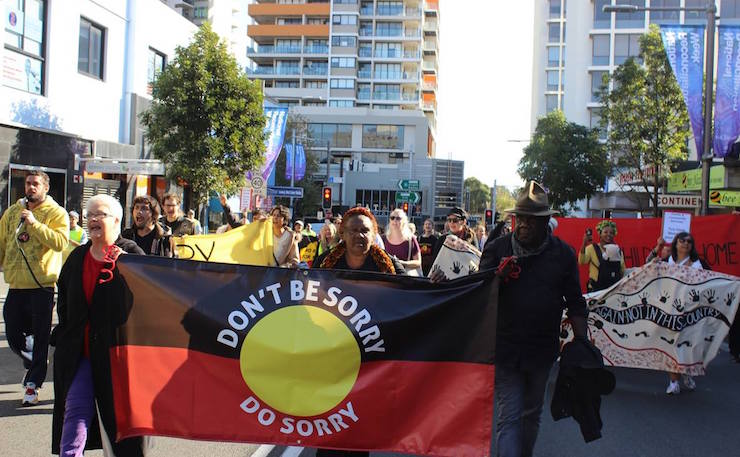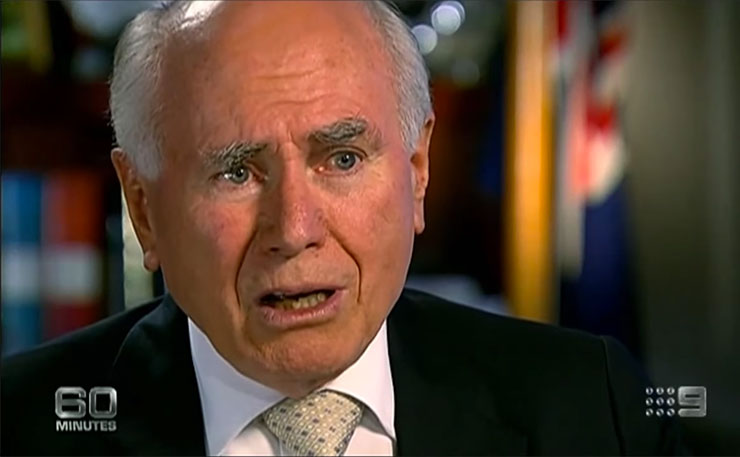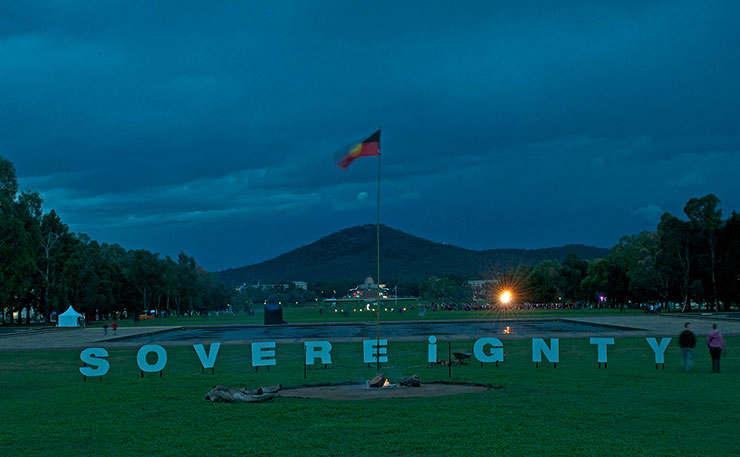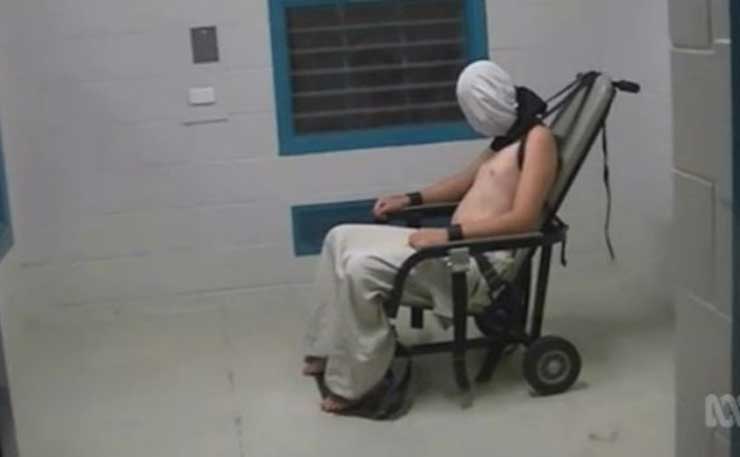The horrors of juvenile detention in the NT shocked Australia, but they are the inevitable result of a system that seeks to punish and to dominate rather than hand back control, writes Liam McLoughlin.
“It is two centuries of policy that brought us here,” writes Helen Razer. “If we permit ourselves to see this as anomalous or shocking and not as the very predictable outcome of ongoing institutional paternalism, then we permit ourselves to see nothing at all.”
It’s fair to say Australia’s 228-year history of invasion, dispossession, genocide, paternalism and institutionalised racism has much to do with the latest horrific evidence of the callous disregard for Aboriginal lives.
Yet responsibility for the torture of mostly Indigenous children at Don Dale Youth Detention Centre need not be so diffuse.
In 1991, the Royal Commission into Aboriginal Deaths in Custody emphasised the importance of self-determination:
“The thrust of this report is that elimination of disadvantage requires an end of domination and an empowerment of Aboriginal people; that control of their lives, of their communities must be returned to Aboriginal hands.”
Of the 339 recommendations, at least 19 tackled self-determination specifically, urging the full participation of Aboriginal communities in decisions about their future.
In the years following the Commission’s report, Prime Minister Paul Keating made advances in this direction, including support for a Social Justice Package. According to the Human Rights Commission, proposals for the package “called for the recognition of the rights of Indigenous people, for the implementation of self-determination as the basis of government policy and for governments to address Indigenous disadvantage as a right and not out of welfare.”
From the time of Howard’s ascension in 1996, successive federal governments have hastily retreated from self-determination, reversing at top speed towards white domination.
Yes, history brought us here. Specifically the two decade history of racist, white supremacist, paternalist policymaking perpetrated by Howard, Rudd, Gillard, Abbott and Turnbull.
Self-Determination Is Essential For Justice

The Australian Human Rights Commission argues that self-determination is fundamental to justice for Aboriginal people. Described as a process of choice for Indigenous Australians to ensure they can meet cultural, social and economic needs, the Commission says, “the loss of this right to live according to a set of common values and beliefs, and to have that right respected by others, is at the heart of the current disadvantage experienced by Indigenous Australians. Without self-determination it is not possible for Indigenous Australians to fully overcome the legacy of colonisation and dispossession.”
The fundamental right for communities to make their own decisions is also prominent under international law. Article 1 of both the International Covenant on Civil and Political Rights and the International Covenant on Economic, Social and Cultural rights states:
“All peoples have the right to self-determination. By virtue of that right they freely determine their political status and freely pursue their economic, social and cultural development.”
This phrase is echoed in Article 3 of the UN Declaration on the Rights of Indigenous Peoples, and according to Article 4:
“Indigenous peoples, in exercising their right to self-determination, have the right to autonomy or self-government in matters relating to their internal and local affairs, as well as ways and means for financing their autonomous functions.”
The domestic policy of several countries around the world includes concrete measures to honour this right to self-determination. Despite signing the Declaration in 2008, Australia is not one of them.
Chair of the Aboriginal Medical Service, Sol Bellear, wrote in The Drum in 2013 about how the indigenous peoples of other countries experience a measure of genuine self-determination.
Australia makes an invidious comparison.
New Zealand, Canada, and the US all have treaties and constitutional recognition. Our Labor leader is terrified of even discussing a Treaty and our Prime Minister misleads the public with lame excuses about Treaty compromising constitutional recognition.
In the United States, many Native American tribes have long had their sovereignty recognised by federal governments and the US Supreme Court. In Australia, our Aboriginal footballers can’t even decide to throw an invisible spear without the country going into meltdown.
Back in the US, more than 250 Native American tribal courts across at least 32 states deal with a wide range of justice issues. Indigenous Australians have no alternative but to endure the punitive racism of the dominant legal system. Australian governments do at least pretend to care about Indigenous justice, but only when Four Corners makes a program about it.
In Canada, an Assembly of First Nations exercises power within Indigenous communities. In the US, individual reservations have a degree of autonomy over law and policing, health, housing, schooling and income. In New Zealand, Maori electorates covering the entire country give reserved positions to representatives of Maori peoples in the nation’s Parliament. Only Maori can vote in these electorates. In Australia, we have just five Indigenous MPs, two short of proportional representation of the Aboriginal population. All five belong to parties which supported the Northern Territory intervention and oppose or equivocate about treaties.
Just how important self-determination is to Indigenous justice has been revealed by extensive international research. The Harvard Project on American Indian Economic Development, which conducted hundreds of studies into Native American governance, drew this conclusion:
“…in a century of U.S. efforts to improve Indian economic and community conditions, Indigenous self-determination is the only policy that has broad, positive, sustained results. Nothing else has worked.”
A comparative study of countries with and without self-determination called Diversity and Indigenous Policy Outcomes: Comparisons between Four Nations also testifies to the urgent need for Aboriginal sovereignty.
In 21 statistical areas ranging across many social, legal and economic outcomes, Australia fares worst in 17 of them, and even the remaining four are debatable. Bear in mind these are 2003 statistics and the trends since then are in some cases in the wrong direction.
The rate of Indigenous over-representation in prison is 10 times that of the US.
Indigenous youth suicide in Australia is twice the rate in New Zealand and three times the rate in the US.
Lifespan for Aboriginal Australian men is 56, compared to 67 or 68 in the other three nations.
The infant mortality rate in Aboriginal communities is close to twice that in New Zealand and the US.
85 per cent of Maori have a post-school qualification, compared to 65 per cent of indigenous peoples in the US and less than 14 per cent of Indigenous Australians.
Author of the study, Paul Kauffman, concluded that self-determination was the crucial factor explaining these stark differences.
Two Decades Of Attacks On Aboriginal Self-Determination

Yet federal Indigenous policymaking isn’t evidence-based, least of all over the past twenty years.
Measured by outcomes for Aboriginal people, policies of the Howard, Rudd, Gillard, Abbott and Turnbull governments have been an unmitigated disaster. The 500 per cent increase since 2010 in the reports of self-harm or suicide by Aboriginal children in the Northern Territory is indicative, as is the failure to meet Close The Gap targets.
As always though, Aboriginal policies aren’t about caring for Aboriginal people.
The long sequence of Aboriginal policy blunders since Howard came to power only make sense when seen in this light – not as blunders, but as strategic, deliberate and highly effective ways to disempower Aboriginal communities. Consider the following sample of policy decisions.
In November 1996, the Howard Government abandoned self-determination as a guiding principle of Indigenous affairs. They replaced it with the idea of ‘self-empowerment’. This is the doctrine behind the government’s calls for Aboriginal people to take responsibility for themselves in getting off welfare, as if systemic racism and the denial of genuine autonomy ain’t no thing.
In the same year the Social Justice Package, with self-determination at its heart, was ditched.
In 1998, Howard tried to internationalise the denial of Aboriginal self-determination. Cabinet urged New Zealand, Canada and the US to support deleting the term from the Draft Declaration on the Rights of Indigenous Peoples.
The Howard Government consistently ignored recommendations on self-determination from an array of inquiries including the Royal Commission into Aboriginal Deaths in Custody and the Bringing them Home Report.
At the peak of the Reconciliation movement, in the year 2000, Howard rejected the language of self-determination in the Draft Declaration of Reconciliation submitted by the Council for Aboriginal Reconciliation.
The apogee of white domination came with the Northern Territory intervention, a clearly racist, profoundly damaging policy designed by the Howard Government under false pretences.
In 2009 the UN Special Rapporteur on the Rights of Indigenous Peoples, Professor James Anaya, reported this about the intervention.
“Of particular concern is the Northern Territory Emergency Response. These measures overtly discriminate against Aboriginal peoples, infringe their right of self-determination and stigmatise already stigmatised communities.”
The two Labor PMs signalled no clear shift to Aboriginal autonomy. Rudd retained the punitive measures of the intervention and abolished the Community Development Employment Program, which employed 33,000 Indigenous people. Gillard extended the intervention for ten years under the banner of Stronger Futures. Both presided over increased child removals, with 6,000 more children in out-of-home care now compared to when Rudd apologised to the Stolen Generations in 2008.
Abbott stepped up attacks on self-determination, cutting $500 million in Indigenous services in his first budget.
A review of developments since the 1991 Royal Commission in The Conversation summed up the radical departure from the only proven path towards Indigenous justice.
“In relation to self-determination, the tendency of the federal government since the mid-1990s has been to increasingly mainstream services for Indigenous people; defund Indigenous-run organisations that have expertise in Indigenous safety and wellbeing; impose top-down policies; and penalise vulnerable Indigenous people (by removing children from their families, criminalising youth and women victims of family violence, and by locking up the mentally ill).”
The same article states that in 1991, Indigenous people made up 14 per cent of the prison population. 25 years later, that rate has increased to 27 per cent. There has been a similar growth in unsentenced Indigenous prisoners in remand.
New Matilda editor Chris Graham summarised the current state of Australia’s justice system in his response to the Don Dale Four Corners.
“In the Northern Territory, Aboriginal people make up almost 90 per cent of the prison population. In juvenile justice it’s 96 per cent. But it doesn’t have the worst record. Western Australia jails its Indigenous population at the highest rate on earth. The incarceration rate of black males in WA is more than eight times greater than it was at the height of Apartheid in South Africa.”
Consider the international evidence on the need for self-determination for Indigenous justice, this two decade domestic campaign to undermine it, and the associated rise in injustice for Aboriginal Australians.
Then consider, who are the real perpetrators of Don Dale and the multiple national tragedies of Aboriginal health, education, suicide, and incarceration?
Royal Commissions Are Ignored, Nothing Less Than Treaty Will Do

Prime Minister Malcolm Turnbull has been praised for responding to the national outcry about Don Dale by announcing a Royal Commission. There are positives to this announcement.
There are also serious flaws. The Liberals are keen for the investigation not only to be as quick as possible, but also as narrow as politically possible. Mr Turnbull has ruled out extending the inquiry beyond the Northern Territory. This is despite calls by human rights advocates for a broader inquiry into juvenile detention, including children in immigration detention. The chances of Turnbull voluntarily submitting the government’s secretive asylum seeker prison regime to proper scrutiny are close to nil.
Even if the Coalition agreed to a more comprehensive approach, both sides of politics have a long track record of ignoring the recommendations of Royal Commissions and other inquiries. As argued by Chris Graham back in 2011,
“If the publication of government reports alone were enough to lift Aboriginal people out of disadvantage,then black Australia would be the healthiest and wealthiest people on the planet.”
I support a Royal Commission into the number of Royal Commissions which have had their recommendations ignored by successive governments
— Celeste Liddle (@Utopiana) July 26, 2016
As in the past, any Royal Commission, no matter how thorough its investigation of prison abuses and Aboriginal incarceration, is likely to be ignored in favour of further oppression and domination.
The only viable path to justice for Aboriginal people is serious national engagement with Aboriginal self-determination. That means treaty or treaties.
As Graham writes, “A treaty is merely an agreement between two parties. In the context of Indigenous peoples living under colonisation, it is self-determination by any other name. The right to run your own affairs.”
The case for treaties is undeniable. Momentum has been building for a national settlement with Indigenous Australians. Evidence from around the world offers strong support. You only have to look across the Tasman to see it.
According to the author of the comparative study on self-determination, Paul Kauffman, “Maori employment and educational rates increased significantly after 1992 because of Treaty settlements and effective programs.”
Judging by Q&A on Monday night, the national conversation remains largely ignorant of the need for self-determination.
As Stan Grant wrote in The Guardian:
“After Four Corners I watched a little of the Q&A panel discuss the horrors of what they had seen. They discussed Indigenous incarceration, black deaths in custody. They answered questions about constitutional recognition.
They talked about the first peoples of this country and there wasn’t even an Indigenous person on the panel. Not one of them even mentioned how utterly inappropriate it is to be talking about us and not including us.
I just wanted to yell at the screen, get out of our lives!”
Nevertheless, millions of Australians are rightly outraged by footage of abuses at Don Dale. Although such abuses are more systemic than aberrant, we now have an opportunity to channel this national outrage into something constructive.
Only by abandoning white domination and embracing Aboriginal self-determination can there be real justice for the kids imprisoned at Don Dale and across Australia.
Only by approaching Aboriginal communities as equal partners, negotiating a Treaty or treaties, and returning rightful sovereignty back to the original custodians of this land, can there be true justice for all Indigenous Australians.
Donate To New Matilda
New Matilda is a small, independent media outlet. We survive through reader contributions, and never losing a lawsuit. If you got something from this article, giving something back helps us to continue speaking truth to power. Every little bit counts.





